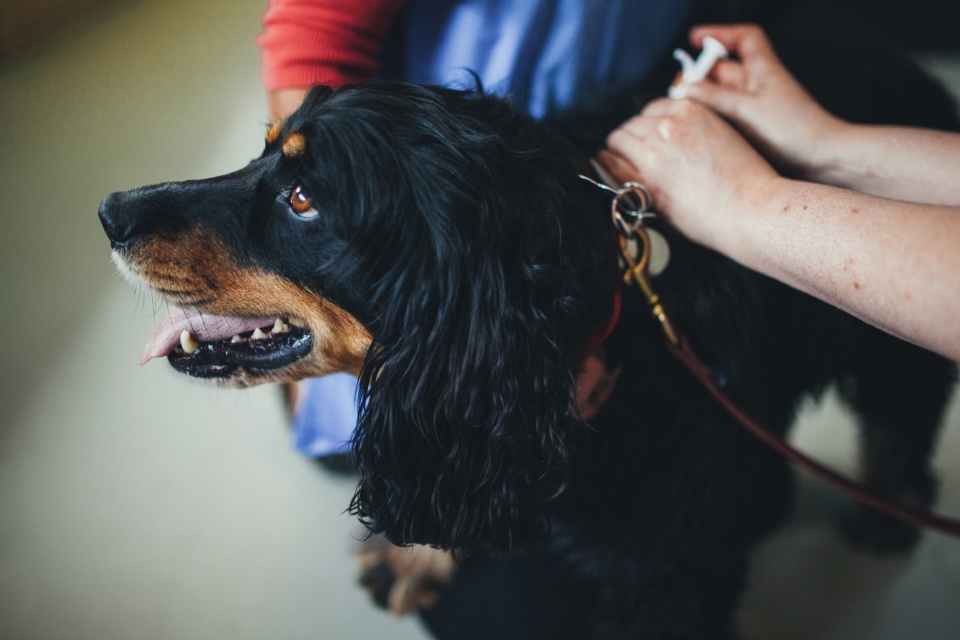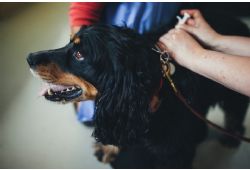Starting January 1st, 2019,
microchips for both cats and dogs will become mandatory in Laval. On the Ville de Laval’s Adopt-a-Pet Day last
April, 300 pet owners got to take advantage of this new service at an
affordable price.
What is microchipping?
Microchipping is when an electronic
chip is implanted beneath the surface of an animal’s skin. The chip is placed
between the shoulder blades by an animal health technician. “It’s like an
injection,” explains Danny Ménard, Director of Development for the Association des techniciens en santé animale
du Québec (ATSAQ). “It’s very similar to a vaccine. For an animal health
technician, it’s a very common procedure.” Though it is always performed under
the supervision of a veterinarian, like Dr. Ludivine Lionnet, who was present
during the Adopt-a-Pet Day microchipping procedures last April.
The microchip itself is about the size
of a single grain of rice. It doesn’t have a battery. Instead, it has a
microscopic transceiver that is activated when scanned by a microchip scanner.
“It’s not a GPS. It’s like the bar code on a cereal box,” says Ménard. When the
chip is scanned by an animal shelter or vet clinic, the tiny transceiver
transmits a unique code associated with the animal owner’s contact information.
A simple search in the database will allow whoever has found the pet to locate
the owner.
Is it painful for the animal?
According to Ménard, the procedure is
both safe and painless. “It’s not invasive. The chip is about 12 millimetres.
It’s most often the context of the situation that is more frightening to the
animal than the implantation itself,” he explains. “The nervousness of the
animal’s owner really affects the pet.” If the owner is nervous, the animal
probably will be, too. On the bright side, cases of chips being rejected or the
area of implantation swelling are very rare. The microchip doesn’t move around
on the animal’s body after it has been placed.
Once implanted, the microchip is good
for life. If your contact information should change, like your address or
telephone number, you will need to have it changed in the database so that you
can be easily contacted in the event you lose your pet.
Starting January 1st, 2019,
every domesticated dog and cat in Laval will need to be equipped with a
microchip. The actual implantation of the chip is an affordable procedure. With
an unlimited life span, the microchip is the most durable and reliable way to
identify your pet.
In an effort to help its citizens, the Ville de Laval has been offering
microchipping clinics since 2012. At any one of these clinics, microchipping is
available for only $25. This year, due to overwhelming demand, the Ville de Laval is also teaming up with
the ATSAQ to offer extra clinics throughout the city. Laval residents can get
their pet’s microchip implant for $35 at these supplemental clinics. For more
information about microchipping clinics, visit www.animaux.laval.ca.
Translated by Maria Barillaro

 In The Latest Issue:Latest Issue:
In The Latest Issue:Latest Issue:
- A Bittersweet Farewell
- The new Laval Aquatic Co...
- The End of an Era:
Articles
Calendar
Virtual- ANNUAL TEACHER APPRECIATION CONTEST
- APPUI LAVAL
- ARTS & CULTURE
- CAMPS
- CAR GUIDE
- CCIL
- CENTENNIAL ACADEMY
- CHARITY FUNDRAISING
- CITYTV
- COSMODÔME
- COMMUNITY CONNECTIONS
- COVER STORY
- DINA DIMITRATOS
- ÉCOLE SUPÉRIEURE DE BALLET DU QUÉBEC
- EDITORIALS
- ÉDUCALOI
- EDUCATION
- EMPLOYMENT & ENTREPRENEURSHIP
- FÊTE DE LA FAMILLE
- FÊTE DU QUARTIER SAINT-BRUNO
- FAMILIES
- FESTIVAL LAVAL LAUGHS
- FÊTE DE QUARTIER VAL-DES-BRISES
- FINANCES
- GLI CUMBARE
- GROUPE RENO-EXPERT
- HEALTH & WELL-BEING
- 30 MINUTE HIT
- ANXIETY
- CHILDREN`S HEALTH & WELLNESS
- CLOSE AID
- DENTAL WELLNESS
- EXTREME EVOLUTION SPORTS CENTRE
- FONDATION CITÉ DE LA SANTÉ
- GENERAL
- HEARING HEALTH
- MESSAGES FROM THE HEALTH AGENCY OF CANADA
- MENTAL HEALTH
- SEXUALITY
- SOCIAL INTEGRATION
- SPECIAL NEEDS
- TEENS
- THE NUTRITION CORNER
- THE NUTRITION CORNER - RECIPES
- VACATION DESTINATION
- WOMEN'S FITNESS
- WOMEN'S HEALTH
- HILTON MONTREAL/LAVAL
- HOME & GARDEN
- INTERNATIONAL WOMEN'S DAY
- JAGUAR LAVAL
- LAVAL À VÉLO
- LAVAL FAMILIES TV SHOW
- LAVAL FAMILIES MAGAZINE CARES
- LAVAL URBAN IN NATURE
- LE PARCOURS DES HÉROS
- LES PETITS GOURMETS DANS MA COUR
- LEON'S FURNITURE
- LEONARDO DA VINCI CENTRE
- LFM PREMIERES
- LIFE BALANCE
- M.P. PROFILE
- MISS EDGAR'S AND MISS CRAMP'S SCHOOL
- MISSING CHILDREN'S NETWORK
- NETFOLIE
- NORTH STAR ACADEMY LAVAL
- OUTFRONT MEDIA
- PASSION SOCCER
- PARC DE LA RIVIÈRE-DES-MILLE-ÎLES
- PÂTISSERIE ST-MARTIN
- PIZZERIA LÌOLÀ
- PLACE BELL
- PORTRAITS OF YOUR MNA'S
- ROCKET DE LAVAL
- SACRED HEART SCHOOL
- SCOTIA BANK
- SHERATON LAVAL HOTEL
- SOCIÉTÉ ALZHEIMER LAVAL
- STATION 55
- STL
- SUBARU DE LAVAL
- TECHNOLOGY
- TEDXLAVAL
- TODAY`S LAURENTIANS AND LANAUDIÈRE
- TODAY`S LAVAL
- WARNER MUSIC
- THIS ISSUE
- MOST RECENT
Magazine
Microchipping: The Future is Now
Articles ~e 105,7 Rythme FM 4 chemins Annual Teacher Appreciation Contest Appui Laval Arts & Culture Ballet Eddy Toussaint Camps THIS ISSUE MORE...
CONTESTS Enter our contests
CONTESTS Enter our contests
CALENDAR
Events & Activities
COMMUNITY Posts Events
PUBLICATIONS Our Magazine Family Resource Directory
LFM BUSINESS NETWORK Learn more
COUPONS Click to save!
COMMUNITY Posts Events
PUBLICATIONS Our Magazine Family Resource Directory
LFM BUSINESS NETWORK Learn more
COUPONS Click to save!
SUBSCRIPTIONS
Subscribe to the magazine
Un-Subscribe
E-NEWSLETTER Subscribe to our E-newsletter Un-Subscribe
WRITE FOR US Guidelines & Submissions
POLLS Vote today!
E-NEWSLETTER Subscribe to our E-newsletter Un-Subscribe
WRITE FOR US Guidelines & Submissions
POLLS Vote today!
ADVERTISERS
How to & Media guide
Pay your LFM invoice
SUGGESTIONS Reader's Survey Suggest a Listing
LFM About Us Our Mission Giving Back Contact Us
SUGGESTIONS Reader's Survey Suggest a Listing
LFM About Us Our Mission Giving Back Contact Us
 PICK-UP LOCATIONS
Get a copy of LFM!
PICK-UP LOCATIONS
Get a copy of LFM!
TERMS & CONDITIONS Privacy | Terms
ISSN (ONLINE) 2291-1677
ISSN (PRINT) 2291-1677
Website by ZENxDESIGN



 BY:
BY: 
Tweet
Share